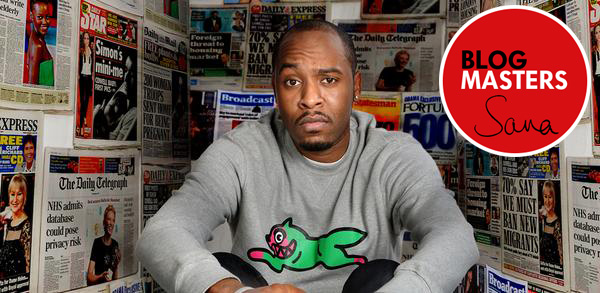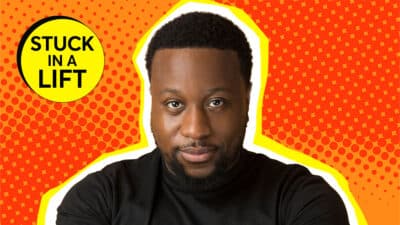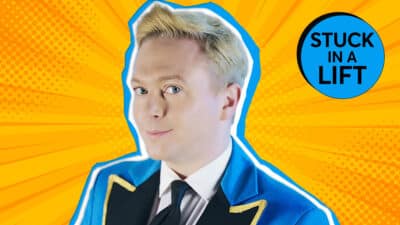Theatre

Ticketmaster meets stand-up comedian Dane Baptiste
South Londoner Dane Baptiste is set perform his debut stand-up show Citizen Dane at this year’s Edinburgh Fringe Festival. Before he does, our resident comedy expert Sara Shulman, from Comedy Blogedy, caught up with him to discus his debut show, how he got into comedy and life as a gigging comedian.
So Dane, having done thousands of gigs – what was your first ever gig like?
My first gig was pretty good. There was quite a significant string of events that lead up to it. I was newly single and had my weekends free. I went to a comedy club with my friends, and one of them spoke to the promoter on my behalf. He said “You’ve got two weeks to do five minutes”. I spent those two weeks trying to write the funniest stuff that I could think of – and failed. It was only with about four days to go and the demise of a rebound relationship I was in that allowed me to concentrate on things that I actually felt at the time, and the truth felt like it was funnier.
This gig also turned out to be some weird school reunion, as well as having a large amount of people from my hood in South London, (yes hood, it was that type of show) showing up for that night. With that added pressure, that five minute set flew by, and I was sure that I’d found my calling.
Since then, having people I grew up with in the audience has always been the best motivation to keep me on my toes, as failure amongst my peers would me entering the witness protection programme. (Note: This gig created a false sense of greatness, and I bombed spectacularly later that year, my ego needed years of physiotherapy, and I was what I called ‘covered in boos’ some of which I still find under my fingernails today.)
How have you found that your material has changed since you first started gigging?
I’ve done a lot of work on both the black and mainstream circuit, so I’ve always challenged myself to craft material that would work for the diverse groups of people that are patrons to both of these circuits. This means constantly creating material that is relatable, original and not patronising, while still being funny because apparently I’m more masochistic than self-deprecating.
I think that as my comedy career has allowed me to widen my horizons through travelling and interacting with such a diverse range of acts and audience members; in turn the topics I cover in my material has been able to become lot more diverse. I’ve encountered a number of different people with varying ideas on the world both on and off stage, which has meant that I’ve had to do the research to see where their perspective comes from. This has allowed me to learn more about these sub-categories of society, and have new concepts form from new ways of thinking. Also being that the comedy scene has grown so much; the possibility of people having ideas for jokes that are similar to your own is a substantial risk; so I’ve worked to make sure the punchlines are so unique that they can only be a component of my set.
Are there any comedians that influence your comedy? How and to what extent does it influence your writing and performance?
I think I’d be worryingly conceited if there wasn’t! I have always loved comedy since I was a child and would like to think my ‘act’ is an amalgam of all of the various comedic influences I have a pre-comedy and post comedy list, in terms of the people that helped to push me in the direction of doing stand up. I also have a post-comedy list of acts that I’ve worked with/watched that continue to inspire to work harder and create better. That being said, I can’t list them all, because I feel that I take something from each performer that I see and enjoy!
Pre-Stand Up: Richard Pryor, Paul Mooney, Keenan Ivory Wayans, Hale and Pace, French and Saunders, Lenny Henry, Roseanne Barr, Russ Abbott, Bob Monkhouse, Richard Blackwood, Victoria Wood, Paul Whitehouse, Dave Chappelle, CHRIS ROCK, Russell Peters, Harry Enfield etc
Post-Stand Up: Hannibal Burress, Holly Walsh, Tina Fey, Tracy Morgan, Celia Pacquola, Benny Boot, Danny ‘Slim’ Gray, Nabil Abdulrashid, Josh Howie, Hal Cruttenden, Simon Evans, Romesh Ranganathan, Lonely Island, Michael Che, Dick Gregory, Patrice O’Neal, Evelyn Mok, Darius Davies, Ola Gbaja Biamila, and all the other comics I work with have an influence on my work.
The amount of new and original material that you generate is rather astonishing. Do you have a process that you go about when you write your material? What advice would you give to other comedians and comedy writers who might struggle with writer’s block?
I don’t know if I can really describe a process; I’m just aware that I come up with the majority of it before I go to bed, en route to gigs and in the shower, so now I’ve had to start taking a phone in the shower so as to not miss anything. My advice to other comedians and writers is to have writing tools at the point where they are most reflective. That can be at any time, or under the influence of ‘creativity stimulating substances’. I also find going over old material with newer, more learned eyes is a good way to get new material out of what may have been old ground.
You perform at a huge variety of gigs, all over the country and to a wide demographic of audience. Does this affect your performance at all?
Not exactly. I make it a point of principle to keep the same material, as most audiences at their core as individuals have the same emotions before the layer of socially suggested labels of race, class and sexual orientation. I do try and have an opener in my set which lets the audience know that I am aware I am a foreigner in your land, and that you have your customs, but here are a series of things that will require you to transcend the first barrier which are the borders of your city/town/country.
I’ll also change the delivery in terms of pace and pitch; as this can make a huge difference to people who may not speak English as a first language, or have a different dialect. Growing up in Lewisham, South East London, the use of slang changes when you go to North London, which you have to be aware of, so that nothing is lost in translation. I also mumble anyway, so it’s good practice for me to pronounce and project. I have a weird voice anyway, so it’s good to distinguish myself by letting everyone know that my voice never fully broke – hooray.
There are several viewpoints about whether a comedian should gig every night of the week or be more selective about the gigs they choose to do. You’re an act that gigs every night of the week and often performs at several gigs each night. Why do you think it’s important to do this? How has it affected your growth as a performer?
I’m not sure about the professional importance of gigging every night. I do it because I can honestly say I love it. I’ve never been musically inclined, but I have a lot of affinity for rapping, in that its spoken word with a rhythm, which is similar to stand up. I try to write on average three minutes of material that’s workable each week, as I feel that’s the equivalent of the output of a productive rapper.
I was brought up in an immigrant household, where working hard, with no breaks, particularly in the legal, clerical or medical profession was the direction I was pushed. I guess I try and alleviate my guilt by trying to apply that work ethic to comedy. It’s meant that I’ve been able to propel myself to a good position in comedy, where I have the experience and material to capitalise on the occasional great gig opportunity I’m offered.
A lot of people find the idea of stand-up quite terrifying because you might get heckled. Is this something you’ve experienced? What do you find is the best way to deal with a heckler?
The best way to deal with a heckler as a comic is to take a breath and look at who is speaking to you. I know that initially when someone breaks your stride whilst the adrenaline is pumping, there is a conflict between fight or flight, and you can become flustered. This can look bad because the crowd trusts you, and if you appear to lose control, they can lose their trust, and having a rapport without any trust is nigh impossible. Sometimes taking that time to digest what has been said in the same way the audience does with you is the best way to prepare a response for a heckler.
You always have to remember that this person is not braver than you are; making comments anonymously in darkness surrounded by friends/supporters without the pressure of success doesn’t take any courage. On the totem pole of scumbags, hecklers are above internet trolls, but below flashers.
Hecklers are usually frustrated comics, trying to see if they are funny enough to do it, and using you as their punchbag. Again, until they do anything about getting on stage, they are still the equivalent of the fat guy shouting at Sky Sports when the football is on; yes his friends agree, but the truth is if he could really do better – he would. With that in mind, the important thing is to remember that battles with hecklers are about egos, and the more training you have with being able to take a bruise to yours, the easier it is to damage someone else’s. Just roll with the punches.
There’s been a lot of discussion in the media about diversity on television and within entertainment. Have you found this has made an impact on your stand-up at all?
I don’t think it’s had a direct influence on my comedy at all. I’ve always strived to be unique in comedy, in that I’ve performed for predominantly black audiences, asian audiences and white audiences without changing the material, as I believe that the people I’m performing for are the same at their core.
Television however, by nature is about image – and aesthetic similar to my own hasn’t been seen on TV for over two decades. And while it hasn’t impacted my stand up so far as material; the responses from audiences are ones of positivity but also bewilderment that televised comedy formats don’t reflect the diversity seen at live shows.
The viewpoint that TV currently offers is very narrow; so much to the point that a ‘one woman on the panel’ became a requisite for that type of show to continue. I won’t go into conspiracy theory, but the statistics speak for themselves, and much like England/Britain’s other sources of national pride, like its football, failure to incorporate and nurture diversity into their power structures will just lead to a steady decline.
You’re taking your debut hour of stand-up ‘Citizen Dane’ to the Edinburgh Fringe Festival this year. How have you found the process of writing and constructing an hour’s solo show? How does it compare to writing shorter sets that you might perform at a club?
I have found it fun and stressful at the same time. My first draft of my show was done in November, and at the time was a ‘Frankenstein of my comedic gold’, but after seven months of previews and previewing the show in four countries, it’s become something completely different. It’s gone from an artificial pastiche of my previous sets to an organic, fully functional show, and I’m happy about that.
The show is about me introducing myself to the industry, festival and the world, and it’s been a great experience. I don’t talk about my life and family in my usual sets; and this show covers all of that. A lot of the stories in there are based on true events, albeit embellished for comedic effect, but the majority of things in there are all flashbacks from my past where I said to myself, “If I survive this, I’ll tell the whole world what I witnessed”.
Citizen Dane is different to my club sets as, because it actually covers parts of my life, I have to deliver the material with the identical mindset I had at that time. This may involve assuming an infantile or adolescent manner which seems to work well, as it paints a more vivid picture. As I have more time to connect to the audience, and they are indulging me for more than the usual 20-25 minutes, I am trying to put as much as possible in there to create something almost cinematic.
Singing, choreographed dancing, thrills, chills, triumph, failure, war, famine, pestilence, death, and desserts all feature in my debut show. I’ve written about three shows in the process of crafting one, which has led to the stress and the recent gentrification of my chin by a few white hairs appearing in some of the richer parts. But as long as the show prospers, we can all co-exist.
Whilst the style of your material is more observational, there’s a real sense of your own perspective and experience in the topics you talk about, which audiences seem to find a strong connection with (and find very funny!). What would you want audiences to take away after seeing you perform?
My show is about the fact that until I did comedy, I never felt like I fit in with any of the social structures or situations I found myself in. That has been a trend that has continued throughout my entire life; and it has always been comedy which I’ve used as my sword and shield in order to survive in these conditions. My perspective has always been so unique because I’m never privy to the statement, “Ah just like me” whenever I get into a conversation with most people, so I’ve always had to talk about things from my own perspective, but do it in a way that people are able to relate to it despite having little to no knowledge of the situations that I’m describing.
I hope really that’s what happens wholesale to audiences after the show, that they feel they’ve learnt about me and found a parallel to an aspect of their own lives. But more than anything I hope that people that watch my show are entertained in a way that no other show at the Fringe is able to offer them, and that they see something that previous fringe offerings haven’t given them.
So far as older members; I’m hoping to revive nostalgia about a time when there was some diversity of acts on television, for younger people, parts of the show have social networks ablaze with new hashtags for some of the more original ideas, and for any industry that watch; they see a creative piece of my vision, and realise that this is essential for the evolution of the festival and the comedy industry as a whole. But I’d really like is for people to watch my show and let me know, “Yes Dane, you were completely right in that situation THEY were crazy, you’re a marine for handling that the way you did, you should write a book/go on tour/the world needs to hear this!”
Dane Baptiste’s debut stand-up show Citizen Dane will be at the Pleasance Courtyard 30th July – 24th August at 5:30pm. For more information head over here.
Like this Blogmaster? Read, listen and see more on Sara Shulman’s Twitter, SoundCloud and YouTube channel, or visit her blog, Comedy Blogedy.









